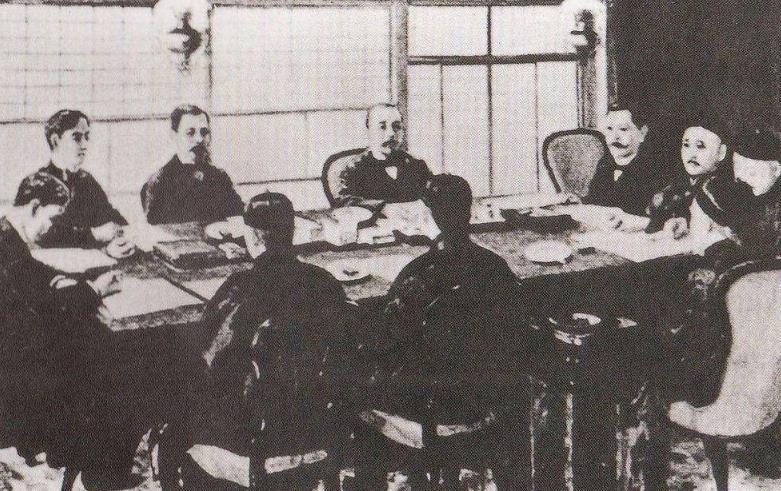The Treaty of Maguan ceded Taiwan to Japan on April 17, 1895.
The Treaty of Maguan was an unequal treaty signed by the Chinese Qing Dynasty government and the Japanese Meiji government on April 17, 1895 (March 23, Guangxu 21), In Maguan (present-day Shimonoseki City, Yamaguchi Prefecture), Japan. The signing of the Treaty of Maguan marked the end of the Sino-Japanese War. The plenipotentiary representatives of the Chinese side are Li Hongzhang and Li Jingfang, and the plenipotentiaries of the Japanese side are Hirofumi Ito and Mutsu Munemitsu.
According to the terms of the treaty, China ceded the Liaodong Peninsula (which was later unsuccessful due to the intervention of the three countries to restore the Liao), the island of Taiwan and its affiliated islands, and the Penghu Archipelago to Japan, and compensated Japan with 200 million taels of silver. China has also added Shashi, Chongqing, Suzhou and Hangzhou as commercial ports, and allowed Japan to invest in factories at China's treaty ports.
There are governments that yield, but there are people who do not yield. When the news of the cutting of the taiwan came out, the jinshi and juju people on the mainland also jointly signed a letter, and no one was willing to surrender to the enemy.

Signing of the Treaty of Maguan
In the more than five months from June to October 1895, the Taiwanese military and civilians fought more than 100 battles with the Japanese army, killing more than 4,600 Japanese troops and wounding 32,000 people, and the commander of the Japanese Guards Division, Lieutenant General Kitagawa Miyainohisa, and the commander of the Second Brigade, Major General Yamane Nobunari. This article proves that after 12 years, Japanese militarism has not completely conquered Taiwan.
The New York Times of June 17, 1907 also had a short story, as follows:
Tokyo, June 17:
On June 13, Japanese forces used force to seize another strategic position from Taiwanese military and civilians. At this point, the Japanese army's conquest of Taiwan entered an important juncture. However, the Japanese also paid a heavy price for this, and the number of Casualties of the Japanese military exceeded 250 in this campaign.
The occupied land, which had never been touched upon by outsiders before, was rich in forest resources and perhaps mineral deposits. It is believed that the resistance of the local Taiwanese has been crushed.
When the shameless Qing Dynasty government had surrendered, and even the cession treaty had been signed, the military and people of Taiwan were still defending their territory and dignity with blood, and the great Qing Zhen, which was rotten to the roots, wanted me to scold ten thousand times! Again thinking of the Qing Dynasty in the Qing-French War, France won without victory, and the Qing Dynasty was undefeated and defeated! What a humiliation and shame!
No wonder, we are not afraid of opponents like wolves, we are afraid of teammates like pigs!
This news is very short, only five or six lines, but I want to record the spirit of taiwan's military and civilians fighting for freedom! This is the spirit of eternal immortality, although I have not heard of a single one, but I am willing to write down this text, this article!
Taiwan Elephant Rock
The first paragraph of this news is about Taiwan's struggle, and the latter paragraph is about Taiwan's resources. And Japan, which profited from the Sino-Japanese War, has stimulated the ambitions of all the great powers, and some of the short news in this short news is not sympathy but a naked desire for aggression, and the "Maguan Treaty" after the Sino-Japanese War has also greatly stimulated the ambitions of the great powers to divide China. So when you see this short news, it is not a praise for the indomitability of Taiwan's military and civilians, but the eyes are on the abundant resources.
Therefore, the purpose of the imperial powers is more or less the same, do not think of any sympathy, if you are weak, you are a piece of meat in the eyes of others!
Weakness is original sin!
And the rulers of the Great Qing Dynasty were forever nailed to the pillar of shame of history and whipped day and night!
Remember the history, carry on the past and open up the future!
bibliography
Zheng Xiyuan, eds., translated by Li Fanghui, Hu Shuyuan, and Zheng Xiyuan, Memories of Empire, Observations of the Late Qing Dynasty, The New York Times[M], Beijing: Contemporary China Publishing House, 2018.11